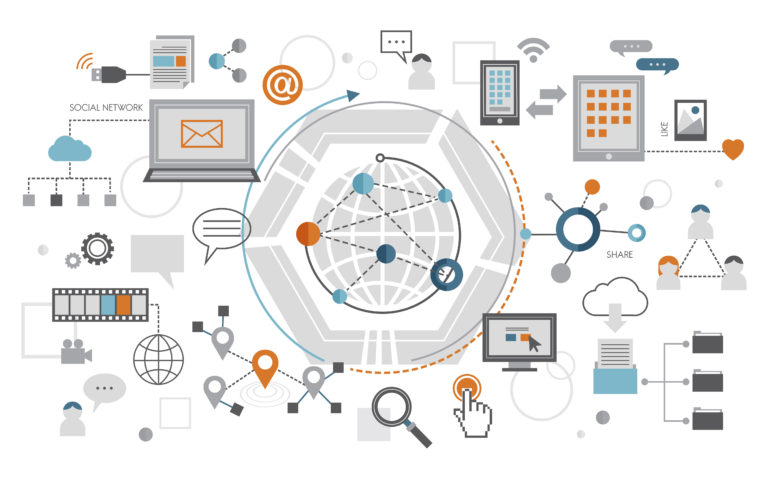In recent decades technological innovation has been a major driver of global growth, as the economic opportunity is interconnected with digital and technological capabilities more and more. Despite the world’s opportunity, technological value is largely concentrated in two major regions – the eastern coast of China and the west coast of the United States.
At the beginning of May 2020, these ‘gold coasts’ had seven of the top 10 companies worldwide by market limit. These areas have built up massive wealth and power and an impressive reputation for technological success.
As the US and China compete for the crown as technology leader, worldwide, trust grows quietly. In the Africa, Israel, Latin America, Russia, the UAE, India, Turkey and Southeast Asia, technological companies bring exciting new products and services to the market. This trend offers Indonesia’s rapidly expanding technology sector a valuable opportunity.
The country now offers a number of information technology opportunities, in particular e-commerce and Fintech, in addition to emerging economy in the regions of Asia, by developing its infrastructure in Indonesia. Google Temasek’s research has demonstrated that the sales of first-hand goods in Indonesia in 2017 peaked with a gross merchandising value of IDR 151.4 trillion (US$10.9 billion), rising by 41% from 2015.
Information Technology in Indonesia: The Highlights
- In Southeast Asia, Indonesia has been the world’s largest spender on IT.
- The internet contributed 2.5% of domestic GDP in Indonesia in 2016.
- By 2025 Indonesia’s internet users will benefit 125 million.
- With a total of 266 million mobile subscribers, Indonesia is the 4th largest mobile market in the world with 112 percent mobile penetration.
- Indonesia has 81.8 billion IDR (USD 8591 million) in 2018 as revenue from the Indonesian electronic trading industry.
- A 17.7 per cent annual growth trend in e-commerce (CAGR 2018-2022) would result in a market value of 228.9 trillion IDR in 2022 (16.5 billion USD).
- The user penetration in e-commerce is expected to be 11.8% in 2018 and 15.7% in 2022.
Indonesia and Information Technology
Indonesians are also extremely social: fourth world on Facebook, third on Twitter and home to 5 million blogs. Indonesians are also highly social in nature. More Jakarta tweets are published than any city in the world. In the coming couple of years, the use of social media like Facebook, a revolutionary advertising business, will move dramatically to non-Western markets.
Companies which have carried out market research in Indonesia know that while it is necessary for social media to introduce brands, consumers in the country continue to value personal advice. TNS Digital Life states actually that nothing can be more effective than a personal suggestion to guide a customer decision.
TNS states that the very reason why brands must have an equally powerful physical and digital presence in the country is the nature of Indonesian society. Moreover, Indonesians are also more worried by the inherent mistrust of Indonesian e-commerce.
Consumers in this country can link to social media but also tend to do so off-line. This is the reverse of western cultures, where “showrooming” hurts certain consumer goods shops. Clients just go to the shop to sample the goods to return home and buy the same items from an online seller.
In a collectivist society like Indonesia, the question of trust is also important for communicating with customers. Marketers know that developing relationships with individuals through off-line interactions is an essential step towards building the confidence they need for a good online connection. Maicih’s domestic cracker is a fitting illustration of how technology-based marketing and conventional direct sells can be effectively combined with very small businesses.
Although it operates in stores and markets throughout the world, a great deal of its marketing work is spent on social media. By using Twitter to take customers to places of mobile cars, it creates a social media buzz which rapidly increases and drives them to mobile places.
Indonesia Outpaces Growth
In the 2020 BCG Tech Challengers report of the Boston Consulting Group, digital and technological opportunities are explored in markets around the world. It reveals a fascinating picture of players that revolve industries, grow rapidly, and threaten incumbent technology giants.
These technology challenges represent 14 countries and are active in several sectors, from all major regions. Although two-thirds of the challenge cuts to consumer apps or services, a third is active in the corporate segments (B2B).
Since 2014, over 10,000 technology companies, almost half (47%) of them outside China, have been founded in the emerging markets. Indonesia has a small but rapidly growing technological sector that accounts for 2 percent of that number. Positively situated behind famous world tech hubs, including Singapore and Israel, are emerging challenges like Indonesia and Brazil.

There has been an increase in the number of companies founded in Indonesia over India, Singapore, Japan and China by 30 per cent year on year. Initiatives like the 1,000 Digital Startup Movement in Indonesia, now the 1.001 Digital Startup Movement, are a useful way to accelerate that growth.
In terms of innovation and geographical location, the technology ecosystem is evolving and diversifying. Emerging markets outside of China account for just 12 percent of the first generation of technology companies. Outside China there are one third (33 percent) of new technology unicorns in emerging markets. Today, 47% of the largest emerging market technology companies are outside the borders of China.
Speedy Technological growth in Indonesia offers great Business Opportunities
In Indonesia more business opportunities were created by the ease of information technology (IT). Indonesia’s growth of IT, particularly mobile, is booming, presenting businesses with profitable opportunities to expand the market in Indonesia.
IT News Today reports the launching of the largest mobile growth in the short term in Brazil, Russia, Indonesia and China.
Moreover, Indonesia is attractive as companies move from elsewhere in Asia because it is:
- The 4th most important mobile market in the world.
- Home to a consumer economy and a 74 million growing middle class (projected to double by 2020).
- Improve its technology and mobile growth infrastructure.
- A very technologically hungry, young country.
Indonesians are also extremely social: fourth world on Facebook, third on Twitter and home to 5 million blogs. Indonesians are also highly social in nature. More Jakarta tweets are published than any city in the world. In the coming couple of years, the use of social media like Facebook, a revolutionary advertising business, will move dramatically to non-Western markets.
Emerging Tech Challengers in 2021
These challenges include hardware, software, cloud computing and services, social media, gaming, IA, advanced analytics and cybersecurity. They offer innovative solutions that penetrate non-traditional industries like health care, logistics and energy.
By expanding into new markets and adding new products and services by developing both in-house and M&A partnerships, Gojek has stimulated its significant growth. It increased its initial focus on hailing by connecting its rider platform to other Jakarta transportation systems and expanding to related companies such as food supply, payments and logistics.

BCG analysed 100 major emerging market technology challengers, which reflect the new wave of ambitious and growing companies, from the emerging technology businesses. They are selected to use their technology, position in industry, business models and proven traction in the market.
This global innovator group comprises 14 countries in each of the world’s major regions. Eight of them in Southeast Asia are home-grown. All of the headquarters in Indonesia are Gojek, Tokopedia, and Visionet Internasional (OVO).
The selected companies reflect a market value of more than $500 million and are a major technological challenger. Their operating models range from the ride-hailing origins of Gojek and Grab to the e-commerce achievements of Lazada and Tokopedia. Over half of the 100 technology leaders have expanded beyond their domestic markets, and 40% are in developed markets.
The challenges in Southeast Asia are committed to the regional gaming field. This is a fast-growing market for nearly 700 million citizens, with significant growth in income, which gives tech companies fertile ground on a scale. The region is identified as a prime market over its initial home market by half of Southeast Asia’s tech champions. This kind of play is already ongoing, the ambitious regional expansion of Gojek shows.
Explore Business Opportunities in Indonesia with Cekindo’s Assistance
Companies wishing to import goods must first follow the registration or registration of companies or of trademarks and register their products in Indonesia. While rules are stringent, with the right company partner in Indonesia the process will be much smoother. Providers like Cekindo help companies in Indonesia, which is a fundamental requirement, to find their own distributor. A trusted business partner in Indonesia is required for the successful introduction of your product and the growth of the physical and virtual brand reputation.
Economic Growth through Information Technology
In conjunction with driver groups like commodity mass consumption, urbanisation, smartphone use and a technologically hungry young population, the rapid development of information technology is having a positive effect on Indonesia’s economic growth.
The nation’s electronic economy is expected to cross Idro 151.4 trillion by 2020 (USD 130 billion), third behind China and India, with current estimates. With an annual growth of 55%, retailers are now exclusive from Indonesia to build mobile platforms for boosting e-market growth, especially in packaged consumer goods. This strategy will facilitate smartphones, tablets and tasks.

Indonesia is the largest IT spending in Southeast Asia, according to the International Data Corporation. In order to achieve a competitive edge in the industry, the public sector spends significantly in improving the internal infrastructure, and the private sector improves customer service.
It is important for both types of industries, as there will be 125 million Internet users in Indonesia in 2025. In addition, a Deloitte report found that Internet contributed 2.0% of the country’s GDP in 2016 in Indonesia, up from just 1.6% in 2011. The increase in Internet use has encouraging Indonesians to buy smartphones, subscribe and make online transactions on a monthly basis. Taking advantage of these developments in Indonesia, information technology in the following decades would be disruptive.
Major Markets in IT in Indonesia
Many businesses worldwide are undergoing digital transformation. Three developments in information technology (IT) are currently increasing in Indonesia, according to NetApp Indonesia. The data are becoming the new currency. Second is that the conventional networks are being taken over by increasingly new network models; and finally, the business growth now depends on cloud computing significantly. E-commerce and fintech are currently Indonesia’s two major and thriving markets.
E-commerce
The e-commerce industry in Indonesia is close to the online market in China at its infancy and offers a huge number of different sellers with social media recommendations. Similarly, E-commerce in Indonesia also marks the original U.S. e-market in the midst of cautious customers and online payments. As a consequence, Indonesia is now catapulting to the global on-line marketplace with the ability to create a combination of the greatest opportunities centred on the American and Chinese e-market economies. The e-commerce market has risen to IDR 81.8 trillion (US$ 8.591 billion) in 2018, research carried out by the Indonesian e-commerce Association and Google.

Easy access to home information and convenient digital payment are two key reasons for the enormous growth in e-commerce, as e-commerce markets in Indonesia exploit. Lazada and Tokopedia are, according to iPrice.com, the first and second highest-revenue e-commerce websites in 2017.
Fintech

Fin technology investments began in Indonesia by storm in 2016. Indonesian start-ups’ investments reached record levels in 2017 – over IDR 5.85 billion (USD 421 million). Until 2018, this pattern continues. Thanks to the enormous boom in e-commerce in Indonesia, a digital payment start-up gold mine was established at Fintech. In Indonesia, there are now over 150 fintech start-ups – almost 78% more than in 2015. An AT Kearney and Google survey have found that Fintech is one of the most appealing industries for IT start-up investors.
More Tech-based Challenges in Indonesia
These tech challenges to the emerging markets are averaged at $6.3 billion, far beyond unicorn. South-east Asian-based companies have the highest average ratings in any other region outside China. The combined value of eight challenger companies in South East Asia amounts to 50 billion dollars, 34 billion dollars over India and 17 challenger companies in South Asia.
Similarly, impressive is the revenue growth of these companies. The average revenue is $2 billion, which is up 70% annually. Six times that in developed markets, technology firms are. This growth is eight times higher in South-East Asia than developed markets. In some cases, the growth of Covid-19 was not limited and provided advantages for technology firms as social and economic transitions drive technology involvement.
Technology companies in the emerging market take different growth routes. Many of them are supported by conglomerates, international technology companies and government funds. In addition to its expertise and resources, this provides valuable finance. The myth of growth driven by robbery and low labour cost is gone. These companies are ambitious and innovative and lead to success on a number of paths.
They take early approaches to ecosystems, thus helping to speed up the path to growth. Many cross the boundaries of industry. Often, they focus on their capacity to solve specific challenges on emerging markets such as increasing financial integration in under-banked or unbanked populations.
OVO has developed its strategy based on an open approach to ecosystems and integrated model creating one of the marketers and partners’ integrated financial ecosystems. OVO has been downloaded to 115 million devices with more than 700,000 participating retailers, with clients able to use it anywhere for payment access, transfers, upgrades and withdrawals, and asset management. More than 373 towns and administrative regenerations throughout Indonesia are accepted for OVO.
Indonesia Tech Challenges – Solution or more Problem?
The ambitious scope of these ecosystem approaches will benefit technology challengers. Research from BCG reveals that the better an ecosystem can afford the more partners in an ecosystem. It’s going to fare the ecosystem.
Tech companies have to recognise the growth of these challenges, but competition is not allegedly necessary.
The challenges of market share, battles for emerging pools of values and the possible confrontations for a global presence are where competition might emerge. For instance, South-East Asian players such as Grab and Gojek are reinforcing their ‘super app’ status, with the increasing proportion of digital consumers. Partnerships among incumbents and opponents are mutually beneficial. Their ecosystem-based approach makes collaborative challenges receptive.
They can increase the potential by opening up shared value chains to new and existing players alike. In many cases, a choice is collaboration or competition. What can be said for sure is that Indonesia’s vibrant technology industry offers significant and rapid growth potential.
IT industry is the main driver of growth
In order to build on existing numerical projects and amplify its digital transformation, the information technology industry will be a pillar of the Indonesian Government. During a virtual meeting, Ahmad M. Ramli, Director of the Ministry of Communications and Information’s Post and Information Administration (PPI), said administration will contribute to building a range of e-commerce platforms for micro-sized, small and medium-sized enterprises and microenterprises, which could in turn help boost employment. To achieve these objectives, he clarified that the PPI would closely track the “quality of service in the postal and logistical sectors.”
“It is a vital part, and this is the flagship programme of PPI this year, during which a major part of the ministry’s future will be the Telecommunications Monitoring Centre, the Post and Logistics & Broadcasting Monitoring Center.”
The Department has also announced that industrial regulations will be developed to allow digital transformation and collaboration between different government sectors. He anticipated that, once government integration is enhanced, the domestic sector will expand. It aims to develop new domestic development policies. According to the Director General of PPI, these arrangements are based on best practises demonstrated by a number of other countries including the US, the UK and the Southeast Asian Nations’ Association Member States (ASEAN).
Ramli also noted that the “follow-up” rule to the Job Creation Law is one of the policies that she plans to set down. This law was approved last year to create more jobs and attract international and domestic investment by relaxing regulatory conditions to obtain business licences and also to handle land acquisitions. This legislation was adopted last year.
In addition to streamlining operations, the Department has noted that its emphasis is on promoting a safe industrial environment. They recognised the “work” of maintaining the health and development of the industry because, in the end, a stable industry will be able to offer the community excellent service, contribute to the government and benefit all telecommunications services.”
Launching new health applications
The PPI also listed the ultimate scale of healthcare services in the launch of new mobile apps. To reinforce this stance, he referred to the application for care and protection that has enhanced public patronage. The applications for COVID-19 vaccines are currently growing by 26 million users. 180 million users are expected to use the app in the future. This is one of the government’s highest accomplishments and played an important role in growing the pandemic’s effects.
In the midst of the pandemic, the Indonesian Government has done great progress in digitising the health sector. As OpenGov Asia reports, the Ministry of Health is considering the integration of vaccine storage and distribution Internet of Things (IoT) technology. The ministry has stated that it is interested in using a framework for the management of the distribution of vaccines established by Bio Farma. This new system ensures that vaccine temperature, storage and shipping are monitored in real time. The method is first used for the delivery of vaccines once applied.
The Rise of Indonesia’s Tech Scene
At this moment, it’s an exciting time for Asia. Due to higher smartphone, tablet ownership and infrastructure penetration in the Asian region, Asia faces the fastest Internet growth in recent years. This rise would also impact the high growth in the area of digital Internet users and digital players. The digital enterprise that offers content and e-commerce is confronted with the challenge of meeting the explosive demand.
The region has become the most important area in Southeast Asia in particular, where Indonesia is the largest market, because of its steadily positive economic growth, and the rest of the world has taken an interest in its slowness.
The critical mass
In the world as the fifth-largest nation to have a population of close to 260 million, Indonesia has a young population of 50% below the age of 27, which, particularly in the positive growth market, has a productive age and is ready to be a consumer market. The digital company of Indonesia, like other companies, has undergone the transition and is now maturing. Indonesian digital enterprise was revitalised from 1997 to 2001 and the Internet situation in the USA shared the same enthusiasm. This was the period when start-up companies had their IPOs and had international companies invest in them.
In the United States, the dotcom crash caused Indonesian start-ups the same problem with the start-up situation in America where they had not had enough users; the infrastructure had just begun; the connections had not been fast enough; founders and investors were insidious and the environment was the base for the digital economy as a whole. The most powerful players survived and the weak had to shut down.
The second rise of start-ups
The second change started in 2007 and continues today. Some local companies that survived the 2001 dotcom crash started to show leadership as top digital companies such as Detik.com and Kaskus.us in Indonesia. New players join the room and exchange success stories like their predecessors. Any of these start-ups have changed their names to Kompas.com, Kapanlagi.com, Okezone.com and Lintasberita.com.
In addition, start-up companies grew substantially. Several success stories have inspired young businesspeople and entrepreneurs to join forces in creating their dream start-up companies. Yahoo acquired a local business in 2009, which gained worldwide attention. GDP Ventures with MCM Group created Merah Putih Incubator to invest in many hot local players such as Mindtalk.com, Dailysocial.net, infokost.net, Krazymarket.com, Lintas.me and Kincir.com.
Kaskus.us has partnered on their brand revamping with the MCM Party, the local community Number One and the classified board in Indonesia. In early 2011 they were also invested by GDP Projects. In the e-commerce region of Indonesia, GDP Ventures has developed a new website named Blibli.com, which has become one of the strong players.
GDP Ventures has encouraged other local actors to join the digital internet enterprise scene. Para Group, a group of local entrepreneurs focusing on the media, invested Detik.com. In order to help carry their media to the digital space, Kompas Grameria, the largest publishing and print media group, formed an investment division. In addition, the scene with the ‘old money or international funds’ has seen more venture capital companies, incubators and accelerators to take part in the digital start-up scene in Indonesia.
The Key Takeaways
Investors are still concerned about a second dotcom crash. The digital market in Indonesia will face a few obstacles in the future. A market full of many entrepreneurs will do both good and bad stuff.
There are several start-ups that have novice founders who don’t know the business game. They cannot stand until the market matures, they cannot separate themselves from rivals and satisfy the needs of customers. Many start-ups will close because they will not be able to thrive in the next few years. But since they started up, some starter companies in Indonesia, such as Tiet.com, Tokopedia and Lintas.me, have demonstrated their potential to shine.
Indonesian players now concentrate on developing an e-commerce, travel, news and niche content ecosystem, payment systems and community networks.
Like e-commerce in different countries, because of their knowledge of business behaviours, customer interest, expenditure and purchasing patterns, the local player is doing better than international players. But the e-commerce ecosystem has not yet matured in Indonesia. For many consumers and a well-capitalised industry, it will take about four more years. The explanation is that the market does not have complete consumer faith when it purchases online and still uses the old purchasing system. The market is still dominated by the most important players in local e-commerce fields, such as Kaskus.us and Tokobagus.com.
Several international players, such like SK Telecom, GREE, Hire, eBay, Tencent, Google, Yahoo!, and Net price have invested in the e-commerce industry by forming a local office or joint venture to get their products and technology to the local market. Services like Zalora, Tokobagus, Multiply, Rakuten, Tokopedia, Bukalapak etc. have been developed.




Leave a Reply